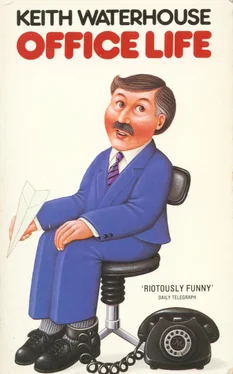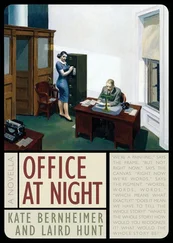The reality was that he and Thelma were in quite a small chamber, of an irregular shape, barely fifteen feet across at its widest. Certainly there was some machinery here but it was housed in enamelled cabinets like freezers or washing machines and controlled, it would seem, by a dusty panel of buttons that didn't look as if they had been pressed for a considerable time. The age of automation with all its failings.
The outer wall, what he could see of it, was indeed circular like the Buttery, and up there, let into the ceiling, was what must be the revolving mechanism. Not an enormous cog-wheel thing at all but simply what appeared to be an endless belt like the hand-rail of an escalator, a very streamlined piece of gadgetry it seemed to be. But only a few degrees of it were visible, for the rest of the chamber, a good three-quarters of it, was partitioned off up to the ceiling in what looked to be very good polished wood. Mahogany, probably.
Thelma, for all that she herself had been making enough racket to waken the dead, raised a finger to her lips and shushed Gryce loudly. Then she pointed to the mahogany-looking panelling. Gryce now saw, was just able to make out, that let into it was a door, absolutely flush with the surrounding woodwork and lacking a handle.
Gryce listened. No question: from the other side of the door could be heard the faintest murmur of voices.
Had he dared speak he would have said: 'Now look here, Thelma, I think it's high time you stopped making a hobby of poking your nose into what can't conceivably be any of your business!' He would then have turned on his heel and marched off, or hurriedly tiptoed off, leaving her to follow or not as she pleased.
Thelma was now pointing first at the battery of machinery units or whatever they were, and then up towards the ceiling, where Gryce could see that high up in the wood-panelled wall there was a ventilation grille. She wanted him to climb up and have a look through it.
Gryce shook his head vehemently. Thelma, with the kind of petulant face she probably put on when her parents told her she couldn't stay out late, began to lurch towards the tallest of the units, directly below the ventilation grille. Gryce grabbed her elbow in alarm. If she was going to clamber on the thing she might as well do a clog-dance on it and have done with it.
Hitching up his trousers he levered himself up and knelt on the enamelled top of the machinery cabinet. It gave out a hollow buckling sound that frightened him. He stayed where he was for a few seconds and then, very slowly, edged forward on his knees until he was able to stand up, which he did in gingerly fashion. Bracing his toes against the squeaking leather of his shoes, a trick it would seem necessary to dredge out of his repertoire every time Thelma was in the immediate vicinity, he raised himself on tiptoe, his face close to the grille of the ventilator.
He was looking down on what appeared to be the company boardroom. Its main feature, certainly the only one that interested Gryce, was a vast oblong conference table, around which sat some twenty or so distinguished individuals surrounded by all the impedimenta of their rank in the way of blotters, scratch-pads, agendas, individual pen-holders on onyx bases, carafes of water, well-used briefcases and the remainder. The chairman, as he presumably was, reclined judiciously in his leather boardroom chair (catalogue No. F/03777) with a gold pen balanced between his two index fingers, while the rest of them carried on a discussion. There was an air-conditioning-type sound coming from somewhere, the Buttery upstairs probably, and Gryce could not hear what any of them was saying. But he could see their faces clearly.
They were mainly military-looking people, they would be the General Parkes-Exley and other gallant souls spoken of at last night's meeting of the Albion Players. Several of them looked familiar: they had probably made appearances on television either in some hour of national crisis or to make appeals on behalf of a favourite charity.
One of the directors, as clearly they all were, looked a bit like President Carter, another looked like Dame Margaret Rutherford although he was in fact a man. An academic that one, by the look of him. A third, with his back to Gryce, momentarily half-turned to hand a paper to his companion, revealing a profile uncommonly like that of a high-ranking Cabinet minister, Gryce had never been sure of his function but he was forever in the news with his controversial speeches on this and that.
Gryce, continuing to peer through the ventilation grille, was now able to inspect this profile at greater length: apparently its owner had made a mistake and handed over the wrong paper; he seemed to be making a humorous apology as he recovered it and substituted the right one. On Gryce's part, however, there was no mistake: the man bore such an uncanny resemblance to that high-ranking Cabinet minister because, without any doubt at all, that was who he was.
Gryce had no time for further reflection. The heavy steel fire-door behind him had swung open on its not-very-well-oiled hinges: framed in its portal was a one-armed commissionaire.
Whether it was the same one who had stopped him on this very floor a few days ago, or Thelma's uncle from the Files Depository, or any permutation of the numerous other commissionaires observed both on and off the premises, Gryce did not wait to enquire. With an alacrity that in retrospect astonished him, he took a flying leap from his enamelled perch, landing by the fire-door just as the commissionaire stepped smartly forward to apprehend him. Heart thumping painfully he sprinted along the narrow corridor, desperately relieved to see that the lift doors at the end of it were open. Even in his panic Gryce was already concocting his story: that he had been quietly lunching when he had been approached by Thelma who had said that she had something to show him; he had followed her into the forbidden lift believing that there was nothing more sinister to be found than the revolving mechanism for the Buttery, which he had very much wanted to see because of a lifelong interest in anything to do with machinery.
12
Gryce's instinct was to return to the seventh floor and mingle with the rest of the gang from Stationery Supplies, the dreaded SS as they were jokingly known. But there was no gang to mingle with. In the continued absence of desks and chairs, an early start to the weekend must have been decided on by one and all.
Over and above an obscure feeling that there was safety in numbers, Gryce was particularly peeved not to find Pam. In the case of ructions, she might have proved an invaluable ally. Besides, he had much to tell her. Again, looking at it from the purely personal angle, one would have thought the woman could have put herself out a bit and waited around for a while, a visit to the cinema was very much on the agenda and they could have fitted it in very nicely this afternoon.
Gryce did not propose to spend the rest of the day propping up the partition and being gawped at by the time-servers of Traffic Control across the way. He would have dearly liked to have heard what account Thelma had to give of herself after her interrogation by the one-armed commissionaire and presumably his superiors, but there was no knowing when, or if, she would return to the seventh floor. She might have been given her marching orders for all Gryce knew. Perhaps Gryce's own marching orders were in preparation. It was not something he wanted hanging over him for a whole weekend, but on the other hand there was little to be gained from loafing about here and waiting for the axe to fall. He wished now that he had read what the guidelines booklet had to say about severance pay.
On the bus to London Bridge, Gryce tried to concoct a suitably plausible yarn for his wife about his unexpected afternoon off. If he could persuade her that he had been sent home early against the prospect of working very late indeed on say Monday or Tuesday, the projected dinner in Soho with Pam could become a reality. But he was unable to concentrate, his head was in a whirl. Every second person he saw looked like the Cabinet minister in the secret boardroom, or like the Home Secretary or the Prime Minister or whoever. The City, when he glanced out of the window as the bus paused at traffic lights, seemed to be seething with one-armed commissionaires. The conductor looked like Muhammad Ali, the woman on the opposite seat like Joan Baez the folk singer. The bus passed a wine bar: he thought he glimpsed Pam and Seeds going into it. A traffic warden on emergency points duty was Copeland, then a second later he was the actor Mervyn Johns. Crossing London Bridge, Gryce saw Mrs Rashman and Mr Hakim walking arm in arm in the direction of Southwark. He would have sworn it was them on a stack of bibles.
Читать дальше












